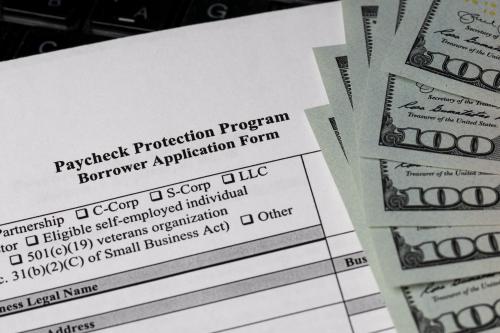As the COVID vaccine becomes widely available – “thank you” to both administrations – we now face the fact that COVID is still spreading and many people don’t want to get vaccinated. Government won’t force them, but their bosses could.
Vaccine skeptics have lots of reasons – “developed too fast,” “side effects,” “don’t trust politicians and government ‘scientists’ pushing it,” etc. There are lots of well-intentioned “messaging studies” on how to overcome those reasons and lots of surveys saying “things are going in the right direction” – a recent one found only 24% are still saying “No way, ever”
But there’s also lots of quiet resistance. Folks who don’t want to get vaccinated don’t want to talk about it. They don’t want to be preached at. And they may even not admit it to pollsters.
Government’s responses are a combination of preaching and free giveaways. A few weeks ago the president added one more: vaccinations were already free, but now employers who let their employees get vaccinated also get tax credits to pay for the lost wages. That’s on top of public service announcements, endorsements from celebrities, and an infinite number of appearances from Dr. Fauci. These are all admirable efforts, and, by comparison with other nations, America is doing well.
But is it enough? Do we really think we’ll get to herd immunity, or even a “manageable threat,” if more than 20% of adults and their children can still carry the virus? Will we have to do more?
The obvious approach is the one we apply in our schools – require vaccination with the usual exceptions for health and religious objections.
Sadly, today’s America is so polarized that almost no one is even seriously discussing it. There are many who argue that vaccination “is a personal decision” and that no one should be required to be vaccinated. This ignores the fact that the consequences of each personal decision can affect thousands of other people. We don’t let people personally decide to drive cars without licenses or seatbelts (or after 3 beers), nor to build what they want on their own land without zoning approval. However, even discussing a vaccination requirement seems taboo.
As an alternative, my colleague Robert Litan suggested going beyond making it free: he proposed cash payments. Governor Jim Justice of West Virginia took up the idea, offering a $100 savings bond to young people who get vaccinated. As a practical matter, though, a national program of vaccine bribery is unlikely to be sufficient, even if it were to get through Congress.
So is there any way to get to herd immunity besides preaching & praying? Yes.
Government won’t mandate vaccination, but employers can if they choose
It is settled law in most states that employers can require vaccination because they have the right (and sometimes the obligation) to set health and safety requirements for their workplaces.[1] Writing for the Society for Human Resource Management, Allan Smith, J.D. stated, “As COVID-19 vaccines become available, many employers will have a strong case for requiring employee vaccinations, so long as their vaccination policies have certain exceptions, are job-related, and are consistent with business necessity…” Some health care companies have already required their staff to vaccinate, but what about everyone else?
Why would employers do this? Perhaps because it would preserve the health of their other employees and their families and make it easier to attract new hires. Perhaps because being able to tell your customers that everyone inside is vaccinated might bring them back more quickly. Or perhaps because it’s the fastest way to stop having to wear masks.
employer immunization requirements could get us to herd immunity
Of course, knowing they can require vaccination doesn’t mean that all employers, or even most, will choose to. Nonetheless, action by even a third of U.S. businesses would, by my estimate, lead to vaccination of an additional 12 million adults and get vaccine acceptance over 80%.[2] It would help to prevent infection of the many children that cannot be vaccinated and still remain vulnerable to COVID-19.
So what would it take? The U.S. Department of Labor (DOL) should spell out clearly how employers can require vaccination to protect their workers while complying with federal law. (DOL’s emergency COVID rules are already overdue and in process, but the agency has produced many regulatory “safe harbors” in the past and could add this without much delay.)
Although the right of employers to require vaccination is clear, there are some exceptions. The Americans with Disabilities Act (ADA) requires employees with allergies or other disabilities that prevent vaccination be offered accommodations such as remote work if doing so would not impose an “undue hardship” on the employer.[3] Title VII of the Civil Rights Act discourages requiring vaccinating those who object due to “sincerely held religious belief, practice or observance,” but this applies only if honoring objections doesn’t impose “more than a de minimus cost or burden.”[4] It’s also worth noting that where employees are protected by a union, a vaccine requirement would likely have to be negotiated.
How many people are covered by these exemptions? Very few. A survey of vaccine-skeptical health care workers conducted in December found that less than 3% mentioned either allergies or religious objections. The common objections to vaccination are not legal exemptions and won’t overcome an employer vaccination requirement.
COVID public health measures have unfortunately been politicized, but letting businesses themselves decide whether or not to require vaccination should be bipartisan: Republicans and those skeptical of government regulation should appreciate that individual businesses will make their own decisions based on their own needs. Democrats can look forward to millions of additional vaccinations.
Since the federal government will not regulate, it should try clarity about what it doesn’t regulate and let markets work. Private decisions by millions of employers, based on their own business needs, might convert the unwilling. The result of these “invisible hands” could be both safer workplaces and a quicker path to a post-COVID America.
[1] Terrell (2020) quoting Prof. Dorit R. Reiss of UC Hastings College of Law
[2] Source: BLS Employment Report March 2021, CIVIQS (2021), and author’s calculations.
[3] The Equal Employment Opportunity Commission (EEOC), which administers the Americans with Disabilities Act, stated “The ADA allows an employer to have a qualification standard that includes ‘a requirement that an individual shall not pose a direct threat to the health or safety of individuals in the workplace.’” EEOC (2020)
[4] Answer K.6. EEOC (2020)
References
Adinolfi, Karen “OSHA’s Rollout of COVID-19 Emergency Temporary Standard on Hold” The National Law Review https://www.natlawreview.com/article/osha-s-rollout-covid-19-emergency-temporary-standard-hold April 20, 2021
CIVIQS.com Coronavirus Vaccination Survey April 20, 2021 https://civiqs.com/results/coronavirus_vaccine?annotations=true&uncertainty=true&zoomIn=true
Keith, Tamara (2021) “How Do You Reach Trump Voters Who Say They Don’t Want The Vaccine? Try Doctors” NPR.org March 19, 2021 https://www.npr.org/2021/03/19/978407316/how-do-you-reach-trump-voters-who-say-they-dont-want-the-vaccine-try-doctors
Kluger, Jeffrey (2021) “Here’s What Will Actually Convince People to Get Vaccinated” Time.com April 2, 2021 https://time.com/5951755/how-to-convince-people-to-get-vaccinated/
Mandavilli, Apoorva, “Reaching ‘Herd Immunity’ Is Unlikely in the U.S., Experts Now Believe” The New York Times May 3, 2021 https://www.nytimes.com/2021/05/03/health/covid-herd-immunity-vaccine.html?smid=em-share
Mastroianni, Peggy, “EEOC Informal Discussion Letter” on religious objections to employer vaccination and other health requirements. March 12, 2012 https://www.eeoc.gov/foia/eeoc-informal-discussion-letter-250
Roy, Brita, Vineet Kumar, & Arjun Venkatesh “Health Care Workers’ Reluctance to Take the Covid-19 Vaccine: A Consumer-Marketing Approach to Identifying and Overcoming Hesitancy” NEJM Catalyst December 29, 2020. https://catalyst.nejm.org/doi/full/10.1056/CAT.20.0676
Siri, Aaron (2021) “Federal law prohibits employers and others from requiring vaccination with a Covid-19 vaccine distributed under an EUA” STAT Feb 23, 2021 https://www.statnews.com/2021/02/23/federal-law-prohibits-employers-and-others-from-requiring-vaccination-with-a-covid-19-vaccine-distributed-under-an-eua/
Smith, Allen (2020) “When Employers Can Require COVID-19 Vaccinations” Society for Human Resource Management December 8, 2020 https://www.shrm.org/resourcesandtools/legal-and-compliance/employment-law/pages/coronavirus-mandatory-vaccinations.aspx
Terrell, Kenneth “Can Your Employer Require You to Get a COVID-19 Vaccine?” AARP December 21, 2020 https://www.aarp.org/work/working-at-50-plus/info-2020/employer-require-covid-vaccine.html
U.S. Centers for Disease Control & Prevention (2021) “Allergic Reactions Including Anaphylaxis After Receipt of the First does of Moderna COVID-19 Vaccine – United States, December 21, 2020-January 10, 2021” Morbidity and Mortality Weekly Report January 29, 2021
U.S. Equal Employment Opportunity Commission (2020) “What You Should Know About COVID-19 and the ADA, the Rehabilitation Act, and Other EEO Laws: Technical Assistance Questions and Answers” Dec. 16, 2020 https://www.eeoc.gov/wysk/what-you-should-know-about-covid-19-and-ada-rehabilitation-act-and-other-eeo-laws
U.S. Occupational Safety & Health Administration (2021b) “National Emphasis Program – Coronavirus Disease 2019 (COVID-19)” DIR 2021-01 March 12, 2021 https://www.osha.gov/sites/default/files/enforcement/directives/DIR_2021-01_CPL-03.pdf
U.S. Occupational Safety & Health Administration (2021a) “Protecting Workers: Guidance on Mitigating and Preventing the Spread of COVID-19 in the Workplace” OSHA notice posted January 29, 2021 https://www.osha.gov/coronavirus/safework
Wilks, Amanda (2021) “4 Commonly Asked Questions From Employers About the Coronavirus Vaccine” Word on Benefits International Federation of Employee Benefit Plans February 3, 2021 https://blog.ifebp.org/index.php/employers-coronavirus-vaccine





Commentary
Op-edGovernment won’t get us herd immunity. Businesses can.
Employers can and should require vaccination.
May 3, 2021